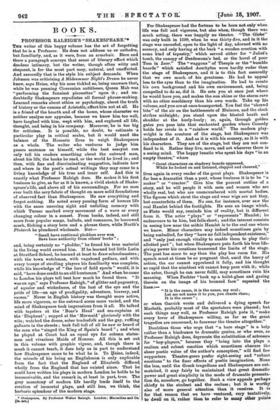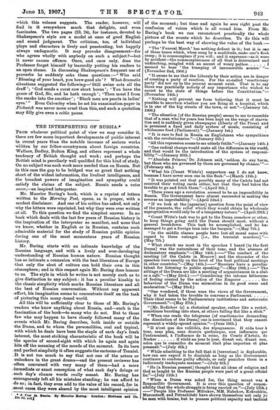BOOKS.
PROFESSOR RALEIGH'S "SHAKESPEARE." Tax writer of this happy volume has the art of forgetting that be is a Professor. He does not address • us tX cathedra, but familiarly, and, as it were, from an armchair. Here and there a paragraph conveys that sense of literary effort which deadens intimacy, but the writer, though often witty and eloquent, is for the moat part easy, natural, and unaffeoted. And assuredly that is the style his subject demands. When Johnson was criticising A Midsummer Night's Dream he never knew, says Heine, why his nose tickled so, being unaware that, while he was penning Ciceronian antitheses, Queen Mab was "performing the funniest pirouettes" upon it ; and un- doubtedly Shakespeare repudiates all formal phrase-making. Learned remarks about ethics or psychology, about the truth of history or the canons of Aristotle, affect him not at all. He is a friend of the hearth and of the home, whose character we neither analyse nor appraise, because we know him too well, have laughed with him, wept with him, and explored all life, thought, and being in his company. Moreover, he is too big for criticism. It is possible, no doubt, to estimate particular play in critical scales, but it would need the balance of the Homeric Zeus to weigh Shakespeare as a whole. The writer who ventures to judge him passes sentence on himself, while the best essayist can only tell his readers something about the outward man, about his life; the books he read, or the world he lived in ; and then, with fine and discriminating suggestion, indicate how and where in the poet's actual writings they may come to a living knowledge of his true and inner self. And this is exactly what Professor Raleigh does. He makes it his first business to give, as far as it is known, a vivid sketch of Shake- speare's life, and above all of his surroundings. For no man ever built the aery fabric of thought on more solid foundations of observed fact than Shakespeare. He saw everything and forgot nothing. He noted every passing form of human life with the same unerring sight and unfailing memory with which Turner marked every movement of a wave or every changing colour in a sunset. From books, indeed, and still more from popular songs, ballads, and romances, be borrowed much, filching a story here and a phrase there, while North's Plutarch he plundered wholesale. But-
" Small have continual plodders over won
Save base authority from others' books " ; and, being certainly no "plodder," he found his tree material in the living world around him. If he learned but little Latin at Stratford School, be learned at least to draw schoolmasters ; with the town watchman, with vagabond pedlars, and with every troupe of strolling players his familiarity was complete, while his knowledge of "the lore of field sports" would, it is said, "have done credit to an old huntsman." And when he came to London his playa tell best how much he found there. "It was an age," says Professor Raleigh," of glitter and pageantry, of squalor and wickedness, of the lust of the eye and the pride of life—an age of prodigality, adventure, bravery, and excess." Never in English history was thought more active, life more vigorous, or the outward scene more varied, and the mind of Shakespeare took impressions from it all. He talked with tapsters at the 'Boar's Head' and sea-captains at the 'Elephant' ; supped at the 'Mermaid' gloriously with the wits; watched the douce, sober tradesfolk and the gay, ruffling gallants in the streets ; took full toll of all be saw or heard of the men who "singed the King of Spain's beard " ; and when he played at Court had an equal eye for solemn states- men and vivacious Maids of Honour. All this is set out in this volume with graphic vigour, and, though there is much it cannot teach, it does help us in part to understand how Shakespeare came to be what he is. To ?eine, indeed, the miracle of his being an Englishman is only explicable from the fact that the England of Elizabeth differed wholly from the England that has existed since.- That he could have written his plays in modern London he bolds to be inconceivable, and the remark is, at least in part, true. The grey monotony of modern life hardly lends itself to the creation of immortal plays, and still less, we think, the barbaric splendour of the modern stage.
. • Shaksapeere. By Professor Walter Raleigh London: Macmillan and
FA net.]
For Shakespeare bad the fortune to be born not only when life was full and vigorous, but also when, though there was much acting, there was happily no theatre. "The Globe" was only built in 1599, when he was thirty-five, and in it the stage was unroofed, open to the light of day, adorned with no scenery, and only having at the back "a wooden erection with some kind of tapestry," which served either for "Juliet's tomb, the canopy of Deademona's bed, or the hovel of poor Tom in Lear." The "waggons" of Thespis or the "humble boards" which satisfied Aeschylus were hardly ruder than the stage of Shakespeare, and it is to this fact assuredly that we owe much. of his greatness. He had to appeal less to the eyes than to the imagination. He had to create his own background and his own environment, and, being compelled to do so, did it. He sets you at once just where he would have you, and makes the sun shine or the storm rave with no other machinery than his own words. Take up his volume, and you are at once transported. You feel the "shrewd bite" of the air on the battlements of Elsinore, and the clock strikes midnight; you stand upon the blasted heath and shudder at the burly-burly; or, again, through golden gates you pass into that enchanted garden where Comedy holds her revels in a " rainbow world." The modern play- wright is the creature of the stage, but Shakespeare was independent of it. And as it is with his scenery, so it is with his characters. They are of the stage, but they are not con- fined to it. Rather they live, move, and act wherever there is a seeing mind. The happy lunatic who spent his days "in an empty theatre," where "Go3at characters on shadowy boards appeared, - While he looked on and listened, clapped and cheered," lives again in every reader of the great plays. Shakespeare is far leas a dramatist than a poet, whose business it is to be "a maker" or "creator." Give him the poorest outline of a story, and he will people it with men and women who are wholly real, but who are unencumbered with mortal bodies. The figures which strut the stage and wear wigs are not they, but counterfeits of them. No one, for instance, ever saw the real Hamlet behind the footlights. He sees an image which, as Plato would say, reminds him of reality, but is different from it. The actor "plays" or "represents" Hamlet;" be endeavours to be him, but falls short; and the interest consists in seeing how near the midric Hamlet is to the real one whom we know. Minor characters may indeed sometimes gain by being embodied, for they "have no full independent existence," and "only just enough vitality to enable them to play their allotted part"; but when Shakespeare puts forth his true life- giving power his creations transcend the limits of the stage. The poet has more to say than the play has room for. His speech must at times be so pregnant that, amid the hurry of action, the ear cannot apprehend it fully, and his thought so rapid that the nimblest wit cannot keep pace with it; while the actor, though he can never fulfil, may sometimes ruin his meaning. When Fechter "took up a toilet-glass and gazing therein on the image of his bronzed face" repeated the lines :-- it is the cause, it is the cause, my soul; Lot me not name it to you, you chaste stars ; It is the cause " ; or when Garrick wrote and delivered a dying speech for Macbeth, probably most of the spectators were pleased ; but such things may well, as Professor Raleigh puts it, "make every lover of Shakespeare willing, as far as the great tragedies are concerned, to forswear the theatre altogether."
Doubtless those who urge that "a bare stage" is a help rather than a hindrance to dramatic genius, or who even, as Professor Raleigh does, deprecate the substitution of actresses for "boy-players," because they "bring into the plays a realism and robust emotion which sometimes obscure the sheer poetic value of the author's conception," will find few supporters. Theatre-goers prefer sight-seeing and "robust emotions" to the finer effects of poetic imagination. None the leas, until the Greek tragedians and Shakespeare are ottt- matched, it may fairly be maintained that great dramatic power and great simplicity in the mode of dramatic presenta- tion do, somehow, go together. Such a view appeals perhaps chiefly to the student and the recluse; but it is worthy also of more general attention than it receives. It is for that reason that we have - ventured, very tentatively, to dwell on it, rather than to refer to many other points
which this volume suggests. The reader, however, will find in it everywhere much that delights, and even fascinates. The two pages (23, 24), for instance, devoted to Shakespeare's style are a model at once of good English and sound judgment. The criticism, too, of individual plays and characters is lively and penetrating, but happily always undogmatic. It may provoke disagreement—for who agrees wholly with anybody on such a subject ?—but it never causes offence. Once, and once only, does the Professor forget himself by learnedly putting his readers to an open shame. In discussing Shakespeare's frequent use of proverbs lie suddenly asks these questions :—" Who said 'Blessing of your heart, you brew good ale ' ? What dramatic situations suggested the following= Still swine eats all the draff '; 'God sends a carat cow short horns '; You have the grace of God, Sir, and he hath enough '; 'Then must I from the smoke into the smother' ; 'Black men are pearls in ladies' ayes.' " Even Calverley when he set his examination-paper in _Pickwick was never more cruel than this, and such a quotation may fitly give even a critic pause.







































 Previous page
Previous page